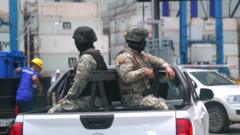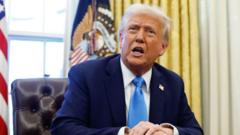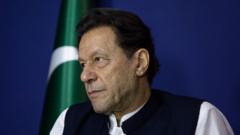Following a spate of violent attacks on prisons across France, speculation mounts that drug gangs are behind the unrest as they react to new legislation targeting the narcotics trade. The government emphasizes the need for elevated security measures and penal reforms to combat the burgeoning influence of these organizations.
Rising Tensions: Attacks on French Prisons Attributed to Drug Gangs Amid Government Crackdown

Rising Tensions: Attacks on French Prisons Attributed to Drug Gangs Amid Government Crackdown
A series of coordinated attacks on French prisons, marked by arson and gunfire, is believed to be the retaliation of drug gangs against a government crackdown on trafficking.
The French prison system is facing unprecedented threats as it grapples with a wave of violent attacks, marking a troubling escalation in tensions. Officially, investigations into these incidents are considering all avenues, from left-wing extremists to international operatives, but significant evidence points toward the involvement of violent drug gangs seeking to retaliate against the government's intensified anti-drug efforts.
Interior Minister Bruno Retailleau articulated the government's stance, asserting that the series of 12 arson and gun-related assaults—occurring over just three nights—can be traced back to drug traffickers. He expressed confidence in this theory, highlighting that gangs were targeting authorities after the introduction of new laws aimed at dismantling their operations. "We declared war on them," Retailleau stated, emphasizing the forthcoming financial impacts on these organizations.
During the attacks, vehicles were deliberately set ablaze outside multiple prisons, and in some instances, firearms were used. Graffiti linking the incidents to a previously unknown group, "Droits des Prisonniers Français" (DDPF) or "Rights for French Prison Inmates," hinted at a philosophical justification that attempts to portray these gangs as champions of human rights for inmates. This narrative appeared in a video they circulated on social media, which criticized Justice Minister Gérard Darmanin and called for more humane conditions for prisoners.
Despite the rhetoric, the gangs’ claim to uphold "human rights" strayed from more familiar far-left adherence, as they failed to display typical ideological characteristics. Law enforcement noted that those recorded during the attacks bore the hallmarks of gang members rather than traditional protestors or activists, leading many to suspect that this group might merely be leveraging social narratives to cloak their criminal enterprises.
Further complicating interpretations of these incidents, investigators are exploring the possibility of foreign interference reminiscent of prior Russian provocations. Yet, as investigations unfold, the prevailing view remains that drug cartels motivated by recent governmental push-back pose the most convincing explanation for the violence.
The current French administration, with a unified stance from both the Interior and Justice Ministers, is navigating a robust political environment focused on the drug crisis. They are propelling legislative changes that promise to stifle the criminal networks’ activities through expanded enforcement capabilities and may lead to the establishment of specialized facilities for the most dangerous offenders.
Plans include building two new high-security prisons specifically aimed at housing influential drug lords, where restrictions on communication and visitor access will be severely tightened. Such measures seek to prevent inmates from continuing illicit operations while incarcerated, a loophole that has previously been exploited by figures like Mohamed Amra, whose story exemplifies the dangers presented by lax prison conditions.
As the situation develops, the government perceives these attacks as a desperate reaction from gangs feeling threatened for the first time. However, the effectiveness and sincerity of this crackdown will rely heavily on capturing and interrogating the perpetrators behind these assaults to validate their approach. French authorities remain optimistic that meaningful progress will soon emerge as they intensify their efforts to restore safety and order within the prison system.



















